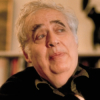Harold Bloom

Harold Bloom
Harold Bloomis an American literary critic and Sterling Professor of Humanities at Yale University. Since the publication of his first book in 1959, Bloom has written more than 20 books of literary criticism, several books discussing religion, and a novel. He has edited hundreds of anthologies concerning numerous literary and philosophical figures for the Chelsea House publishing firm. Bloom's books have been translated into more than 40 languages...
NationalityAmerican
ProfessionTeacher
Date of Birth11 July 1930
CountryUnited States of America
The world gets older, without getting either better or worse and so does literature. But I do think that the drab current phenomenon that passes for literary studies in the university will finally provide its own corrective.
Dark influences from the American past congregate among us still. If we are a democracy, what are we to make of the palpable elements of plutocracy, oligarchy, and mounting theocracy that rule our state? How do we address the self-inflicted catastrophes that devastated our natural environment? So large is our malaise that no single writer can encompass it. We have no Emerson or Whitman among us. An institutionalized counterculture condemns individuality as archaic and depreciates intellectual values, even in the universities. (The Anatomy of Influence)
Reading well makes children more interesting both to themselves and others, a process in which they will develop a sense of being separate and distinct selves.
I don't believe in myths of decline or myths of progress, even as regards the literary scene.
Criticism starts - it has to start - with a real passion for reading. It can come in adolescence, even in your twenties, but you must fall in love with poems.
But in the end, in the end one is alone. We are all of us alone. I mean I'm told these days we have to consider ourselves as being in society... but in the end one knows one is alone, that one lives at the heart of a solitude.
We read deeply for varied reasons, most of them familiar: that we cannot know enough people profoundly enough; that we need to know ourselves better; that we require knowledge, not just of self and others, but of the way things are. Yet the strongest, most authentic motive for deep reading…is the search for a difficult pleasure.
... one doesn't want to read badly any more than live badly, since time will not relent. I don't know that we owe God or nature a death, but nature will collect anyway, and we certainly owe mediocrity nothing, whatever collectivity it purports to advance or at least represent.
I am not unique in my elegiac sadness at watching reading die, in the era that celebrates Stephen King and J.K. Rowling rather than Charles Dickens and Lewis Carroll.
Reading well is one of the greatest pleasures that solitude can afford you.
We all fear loneliness, madness, dying. Shakespeare and Walt Whitman, Leopardi and Hart Crane will not cure those fears. And yet these poets bring us fire and light.
Criticism in the universities, I'll have to admit, has entered a phase where I am totally out of sympathy with 95% of what goes on. It's Stalinism without Stalin.
All that a critic, as critic, can give poets is the deadly encouragement that never ceases to remind them of how heavy their inheritance is.
There is no method except yourself.